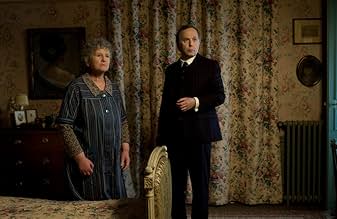Les femmes du 6e étage
- 2010
- Tous publics
- 1h 44min
NOTE IMDb
7,1/10
11 k
MA NOTE
Dans le Paris des années 60, la vie d'un couple conservateur est bouleversée par un groupe de servantes espagnoles vivant dans le même bâtiment.Dans le Paris des années 60, la vie d'un couple conservateur est bouleversée par un groupe de servantes espagnoles vivant dans le même bâtiment.Dans le Paris des années 60, la vie d'un couple conservateur est bouleversée par un groupe de servantes espagnoles vivant dans le même bâtiment.
- Réalisation
- Scénario
- Casting principal
- Récompenses
- 2 victoires et 3 nominations au total
Avis à la une
In the 60's, in Paris, the middle-aged stockbroker Jean-Louis Joubert (Fabrice Luchini) is an uptight man that lives with his wife snobbish wife Suzanne (Sandrine Kiberlain) on the first floor of a building that belongs to him. Jean-Louis and Suzanne live a boring life and they have two arrogant sons in a boarding school.
When their maid quits the job, they hire the charming Spanish maid María Gonzalez (María Gonzalez) and Jean-Louis is introduced to a joyful Spanish community of maids on the 6th floor of his building. Jean-Louis learns about the Spanish costumes and improves the lives of the immigrants with minor support in their live condition. He also rekindles his own life with Maria and her friends. But when Maria unexpectedly returns to Spanish, Jean-Louis rethinks his life and values.
"Les Femmes du 6ème Étage" is a delightful romantic comedy based on the fight of classes and cultural differences between the French upper class and the Spanish immigrants in the early 60's in Paris. I loved this film, the cast, the direction, the characters and specially the lovely smile and look of María Gonzalez. My vote is eight.
Title (Brazil): "As Mulheres do 6o Andar" ("The Women of the 6th Floor")
When their maid quits the job, they hire the charming Spanish maid María Gonzalez (María Gonzalez) and Jean-Louis is introduced to a joyful Spanish community of maids on the 6th floor of his building. Jean-Louis learns about the Spanish costumes and improves the lives of the immigrants with minor support in their live condition. He also rekindles his own life with Maria and her friends. But when Maria unexpectedly returns to Spanish, Jean-Louis rethinks his life and values.
"Les Femmes du 6ème Étage" is a delightful romantic comedy based on the fight of classes and cultural differences between the French upper class and the Spanish immigrants in the early 60's in Paris. I loved this film, the cast, the direction, the characters and specially the lovely smile and look of María Gonzalez. My vote is eight.
Title (Brazil): "As Mulheres do 6o Andar" ("The Women of the 6th Floor")
A great review by Robert Beames (coulden't have done it better myself!!) It has been given the more toner-friendly English language title of Service Entrance, but comic French drama Les Femmes Du 6eme Etage translates literally as The Women on the 6th Floor. Shown out of competition in Berlin, the film was very warmly received thanks in part to the performances of its sweet and amiable leading man, Fabrice Luchini, and its beautiful Spanish leading lady played by Natalia Verbeke. These actors combine with the film's leisurely pacing and entertaining scenario to ensure that it is a winsome and inoffensive crowd-pleaser.
The film, set in the 1960s, follows a wealthy, middle-aged Parisian stockbroker named Jean-Louis (Luchini) whose long-standing maid quits following a row with his demanding wife Suzanne (Sandrine Kiberlain). Unable to clean up after themselves, the couple desperately need a new maid. But when Suzanne's high society friends insist French maids aren't the done thing anymore, she enlists the help of Maria (Natalia Verbeke), a feisty, young Spanish immigrant. Jean-Louis forms an instant and obsessive attraction to her and to all things Spanish, soon striking up unlikely friendships with all the Spanish ladies who live in the servant's quarters above his home – a place he knows nothing about despite living in the building his entire life. Worlds collide and good-natured japes ensue as he helps each lady adjust to life in France whilst himself inheriting a new found love of life.
I don't think it's necessarily a coincidence that both the more shamelessly enjoyable films I've seen here up to now have been broad comedies about cultural difference and histories of mass immigration – with Almanya looking at German-Turks and Service Entrance exploring the relationship, and the comedy that comes of misunderstanding, between the French and their Spanish workforce. Immigration is still a political hot potato issue in these countries, as it remains in much of Europe, and maybe light-hearted comedy is seen as the best way to preach tolerance, reaching a bigger audience than earnest polemic. In mocking bigotry and by setting it in the past (as an old fashioned attitude) perhaps it is felt that people might be less inclined to identify with those views.
In any case both films are funny and have their hearts firmly in the right place. This French offering is gentler and less ballsy than it's Turkish-German counterpart, but no less enjoyable. The character of Jean-Louis is incredibly easy to like, being child-like in his enthusiasm for his new-found interest in Spain. The character of Suzanne is also refreshingly balanced and nuanced. She'd usually be a two-dimensional figure we would be encouraged to dislike in order to make it permissible for Jean-Louis to consider romance with Maria and yet the film doesn't go down that route: she can be annoying and insensitive but she isn't a nasty person. Maria and the other Spanish ladies are also a joy to watch as they interact with one another and fuss over cheerful little Jean-Louis.
Service Entrance is the filmic equivalent of a soufflé and certainly not a tough watch typical of the standard festival fare. Indeed it falls into the dubious realm of the "feel good" movie. But sandwiched, as it is here, between two-hour long Shakespeare adaptations, Bela Tarr movies, Argentinian slow cinema and films about nuclear disasters, it is exactly the kind of film you need to see in order to keep sane. It is difficult to say whether wider criticism in France will be anything like as positive when removed from this context on theatrical release, but here it offered exactly what was needed and nobody appreciated that more than I.
The film, set in the 1960s, follows a wealthy, middle-aged Parisian stockbroker named Jean-Louis (Luchini) whose long-standing maid quits following a row with his demanding wife Suzanne (Sandrine Kiberlain). Unable to clean up after themselves, the couple desperately need a new maid. But when Suzanne's high society friends insist French maids aren't the done thing anymore, she enlists the help of Maria (Natalia Verbeke), a feisty, young Spanish immigrant. Jean-Louis forms an instant and obsessive attraction to her and to all things Spanish, soon striking up unlikely friendships with all the Spanish ladies who live in the servant's quarters above his home – a place he knows nothing about despite living in the building his entire life. Worlds collide and good-natured japes ensue as he helps each lady adjust to life in France whilst himself inheriting a new found love of life.
I don't think it's necessarily a coincidence that both the more shamelessly enjoyable films I've seen here up to now have been broad comedies about cultural difference and histories of mass immigration – with Almanya looking at German-Turks and Service Entrance exploring the relationship, and the comedy that comes of misunderstanding, between the French and their Spanish workforce. Immigration is still a political hot potato issue in these countries, as it remains in much of Europe, and maybe light-hearted comedy is seen as the best way to preach tolerance, reaching a bigger audience than earnest polemic. In mocking bigotry and by setting it in the past (as an old fashioned attitude) perhaps it is felt that people might be less inclined to identify with those views.
In any case both films are funny and have their hearts firmly in the right place. This French offering is gentler and less ballsy than it's Turkish-German counterpart, but no less enjoyable. The character of Jean-Louis is incredibly easy to like, being child-like in his enthusiasm for his new-found interest in Spain. The character of Suzanne is also refreshingly balanced and nuanced. She'd usually be a two-dimensional figure we would be encouraged to dislike in order to make it permissible for Jean-Louis to consider romance with Maria and yet the film doesn't go down that route: she can be annoying and insensitive but she isn't a nasty person. Maria and the other Spanish ladies are also a joy to watch as they interact with one another and fuss over cheerful little Jean-Louis.
Service Entrance is the filmic equivalent of a soufflé and certainly not a tough watch typical of the standard festival fare. Indeed it falls into the dubious realm of the "feel good" movie. But sandwiched, as it is here, between two-hour long Shakespeare adaptations, Bela Tarr movies, Argentinian slow cinema and films about nuclear disasters, it is exactly the kind of film you need to see in order to keep sane. It is difficult to say whether wider criticism in France will be anything like as positive when removed from this context on theatrical release, but here it offered exactly what was needed and nobody appreciated that more than I.
Fabrice Lucchini, famous French actor well-known for his flamboyant demeanour, is playing an invisible man in this film, which placed in Paris in the 1960's. He opens up to life while meeting the group of Spaniard maids living above his apartment. His wife, played by Sandrine Kiberlain, disagree with him because he's talking to these people who are not from the same social class. Both Lucchini and Kiberlain are very good in this film. The actress who's playing Maria Gonzalez cast, Natalia Verbeke, is offering a splendid performance. I've never seen her playing before. The end of the movie is quite common and deceiving, but it's doesn't erase the fun we had watching this very niece movie.
Thank goodness I got tired of the trash that Hollywood tips out like churned mince through a mincer and decided to begin watching foreign films!
French movies, in particular, seem to have a knack for producing a love story that doesn't leave me puking with either boredom or the sheer stupidity and bad acting.
This is one such little gem. Delightful, understated, charming. When a Spanish maid moves to France she takes a job with a wealthy businessman and his detached wife. As the wife listens more and more to her malicious, gossipy society friends, she becomes suspicious of her husband having an affair.
Her husband certainly is up to many things, but he's a lovely man, played delightfully, and he's falling in love alright... with a whole new way of life.
I enjoyed every minute of this!
French movies, in particular, seem to have a knack for producing a love story that doesn't leave me puking with either boredom or the sheer stupidity and bad acting.
This is one such little gem. Delightful, understated, charming. When a Spanish maid moves to France she takes a job with a wealthy businessman and his detached wife. As the wife listens more and more to her malicious, gossipy society friends, she becomes suspicious of her husband having an affair.
Her husband certainly is up to many things, but he's a lovely man, played delightfully, and he's falling in love alright... with a whole new way of life.
I enjoyed every minute of this!
A great movie, with wonderful actress and actor, soft, funny, intelligent and deeper as it seems apparently. If you pay attention the flick will let you think upon many things and, in any case, you will leave the theater in a good and serene mood not only in your mind, but also in your heart. Very refreshing!!! Luchini is excellent (as always) in his wonderful character. He recognize the opportunity to change his life and he seize it on. Today maybe it is hard to imagine that a rich man can show that kind of interest for people of a such different social condition. But in the Sixties sometimes that could happen, the social dehumanization was not so advanced like today, in spite of all the contradictions of those years, which are very well represented. Very good also Kiberlain as his wife. She is perfect in her attitude as snooty new rich. The whole cast of the movie and especially the Spanish women are simply great: they show how a change was urgently requested, at that time... and let us understand, today also!
Le saviez-vous
- AnecdotesPhilippe Le Guay took inspiration from his own childhood. His father was a stockbroker like Jean-Louis Joubert in the film and he himself had a Spanish maid.
- GaffesIn the street, most (if not all) men wear hats, caps or Basque berets. In France, most men stopped wearing headgear in the 1950s (in cities at least). By 1960, the vast majority of men were hatless.
- ConnexionsFeatured in Ebert Presents: At the Movies: Épisode #2.13 (2011)
- Bandes originalesItsi Bitsi, Petit Bikini
(Itsy Bitsy Teenie Weenie Yellow Polkadot Bikini)
Music by Lee Pockriss
English lyrics by Paul Vance
French lyrics by Lucien Morisse and André Salvet
Performed by Dalida
© Emily Music Corporation and Music Sales Corporation
Avec l'aimable autorisation de Campbell Connelly France
(P) 1960 Barclay
Avec l'autorisation de Universal Muis Vision
Meilleurs choix
Connectez-vous pour évaluer et suivre la liste de favoris afin de recevoir des recommandations personnalisées
- How long is The Women on the 6th Floor?Alimenté par Alexa
Détails
- Date de sortie
- Pays d’origine
- Sites officiels
- Langues
- Aussi connu sous le nom de
- The Women on the 6th Floor
- Lieux de tournage
- Sociétés de production
- Voir plus de crédits d'entreprise sur IMDbPro
Box-office
- Budget
- 7 000 000 € (estimé)
- Montant brut aux États-Unis et au Canada
- 719 823 $US
- Week-end de sortie aux États-Unis et au Canada
- 26 200 $US
- 9 oct. 2011
- Montant brut mondial
- 27 533 970 $US
- Durée1 heure 44 minutes
- Couleur
- Mixage
- Rapport de forme
- 1.85 : 1
Contribuer à cette page
Suggérer une modification ou ajouter du contenu manquant

Lacune principale
By what name was Les femmes du 6e étage (2010) officially released in India in English?
Répondre
![Regarder Bande-annonce [OV]](https://m.media-amazon.com/images/M/MV5BNTdmOTBjM2UtOTUyMS00NDViLWI4NWEtNmVhODc1NDVjN2NlXkEyXkFqcGdeQXRyYW5zY29kZS13b3JrZmxvdw@@._V1_QL75_UX500_CR0)



























